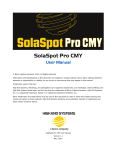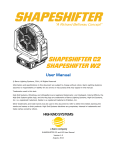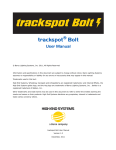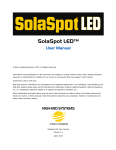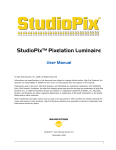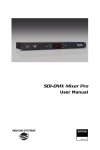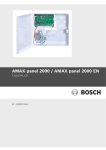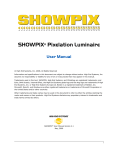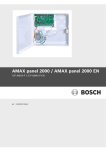Download User Guide - High End Systems
Transcript
Professional Moving Head User Manual Version 1.0.0 Table of Contents Welcome 3 Contacting High End Systems ® Patents Warranty Information Important Safety Information 4 7 9 10 Fixture Overview 11 Features 13 Safety Considerations 14 General Guidelines 15 Installation Instructions 16 Dimensional Drawings 17 Mounting Orientations 18 Linking Fixtures 19 DMX Start Address 21 Fixture Control Board 22 Control Board Functions 24 Preset Programming and Playback 32 DMX Protocol 37 Error Codes 42 ii Welcome Notice © Barco Lighting Systems, 2014, All Rights Reserved Information and specifications in this document are subject to change without notice. Barco Lighting Systems assumes no responsibility or liability for any errors or inaccuracies that may appear in this manual. Trademarks used in this text: High End Systems, Wholehog, and Lithopatterns are registered trademarks: and intellaspot, Internal Effects, the High End Systems globe logo, and the Hog logo are trademarks of Barco Lighting Systems, High End Systems, Inc. is a registered trademark. Belden is a registered trademark of Belden, Inc. Other trademarks and trade names may be used in this document to refer to either the entities claiming the marks and names or their products. High End Systems disclaims any proprietary interest in trademarks and trade names owned by others. 3 Contacting High End Systems ® Sales Department High End Systems, Inc. 2105 Gracy Farms Lane Austin, TX 78758 USA voice:512.836.2242 fax:512.837.5290 Toll Free: 800.890.8989 Customer Service High End Systems, Inc. 2105 Gracy Farms Lane Austin, TX 78758 USA voice:800.890.8989 fax: 512.834.9195 toll free: 800.890.8989 email: [email protected] World Wide Web http://www.highend.com 4 5 6 Patents This High End Systems product is protected by patents and pending patent applications. Patents owned or licensed by High End Systems include: US 4,392,187; US 4,602,321; US 4,688,161; US 4,701,833; US 4,709,311; US 4,779,176; US 4,800,474; US 4,962,687; US 4,972,306; US 4,980,806; US 5,010,459; US 5,031,078; US 5,073,847; US 5,078,039; US 5,186,536; US 5,209,560; US 5,278,742; US 5,282,121; US 5,307,295; US 5,329,431; US 5,331,822; US 5,367,444; US 5,402,326; US 5,414,328; US 5,426,576; US 5,430,629; US 5,432,691; US 5,454,477; US 5,455,748; US 5,502,627; US 5,506,762; US 5,515,254; US 5,537,303; US 5,545,951; US 5,588,021; US 5,590,954; US 5,590,955; US 5,640,061; US 5,647,662; US 5,691,886; US 5,702,082; US 5,728,994; US 5,758,955; US 5,758,956; US 5,769,527; US 5,769,531; US 5,774,273; US 5,788,365; US 5,794,881; US 5,795,058; US 5,798,619; US 5,806,951; US 5,812,596; US 5,823,661; US 5,825,548; US 5,828,485; US 5,829,868; US 5,857,768; US 5,882,107; US 5,921,659; US 5,934,794; US 5,940,204; US 5,945,786; US 5,953,151; US 5,953,152; US 5,969,485; US 5,980,066; US 5,983,280; US 5,984,248; US 5,986,201; US 6,011,662; US 6,029,122; US 6,048,080; US 6,048,081; US 6,054,816; US 6,057,958; US 6,062,706; US 6,079,853; US 6,126,288; US 6,142,652; US 6,142,653; US 6,172,822; US 6,175,771; US 6,188,933; US 6,208,087; US 6,219,093; US 6,220,730; US 6,241,366; US 6,249,091; US 6,255,787; US 6,256,136; US 6,261,636; US 6,278,542; US 6,278,545; US 6,278,563; US 6,288,828; US 6,326,741; US 6,327,103; US 6,331,756; US 6,346,783; US 6,421,165; US 6,430,934; US 6,459,217; US 6,466,357; US 6,502,961; US 6,515,435; US 6,523,353; US 6,536,922; US 6,538,797; US 6,545,586; US 6,549,324; US 6,549,326; US 6,563,520; US 6,565,941; US 6,570,348; US 6,575,577; US 6,578,991; US 6,588,944; US 6,592,480; US 6,597,132; US 6,600,270; US 6,601,974; US 6,605,907; US 6,617,792; US 6,621,239; US 6,622,053; US 6,635,999; US 6,648,286; US 6,664,745; US 6,682,031; US 6,693,392; US 6,696,101; US 6,719,433; US 6,736,528; US 6,771,411; US 6,775,991; US 6,783,251; US 6,801,353; US 6,812,653; US 6,823,119; US 6,865,008; US 6,866,390; US 6,866,402; US 6,866,451; US 6,869,193; US 6,891,656; US 6,894,443; US 6,919,916; US 6,930,456; US 6,934,071; US 6,937,338; US 6,955,435; US 6,969,960; US 6,971,764; US 6,982,529; US 6,988,805; US 6,988,807; US 6,988,817; US 7,000,417; US 7,011,429; US 7,018,047; US 7,020,370; US 7,033,028; US 7,048,838; US 7,055,963; US 7,055,964; US 7,057,797; US 7,073,910; US 7,078,869; US 7,092,098; US 7,119,902; US 7,161,562; US 7,175,317; US 7,181,112; US 7,206.023; US 7,210,798; US 7,253,942; US D347,113; US D350,408; US D359,574; US D360,404; US D365,165; US D366,712; US D370,080; US D372,550; US D374,439; US D377,338; US D381,740; US D409,771; AT E169413; CA 2142619; CA 2145508; CA 2245842; DE 22588.4-08; DE 621495; DE 655144; DE 69320175.4; DE 69322401.0; DE 69331145.2; DE 69525856.7; DE 69734744.3; DE 797503; DK 0655144; DK 1447702; EP 0475082; EP 0621495; EP 0655144; EP 0662275; EP 0767398; EP 0797503; EP 0969247; EP 1447702; ES 0621495; FR 0621495; FR 0655144; FR 0662275; FR 1447702; GB 2043769B; GB 2055842B; GB 2283808B; GB 2290134B; GB 2291814B; GB 2292530B; GB 2292896B; GB 2294909B; GB 2295058B; GB 2303203B; GB 2306887B; GB 2307036B; GB 2316477B; IE 0621495; IT 034244BE; 2005; IT 0621495; IT 0655144; JP 3495373; JP 3793577; NL 0621495; NL 0797503; NL 0969247; UK 0621495; UK 0655144; UK 0662275; UK 0797503; UK 0969247; UK 1447702; 7 8 Warranty Information Limited Warranty Unless otherwise stated, your product is covered by a one year parts and labor limited warranty. Dichroic filters and LithoPatterns® high resolution glass gobos are not guaranteed against breakage or scratches to coating. It is the owner’s responsibility to furnish receipts or invoices for verification of purchase, date, and dealer or distributor. If purchase date cannot be provided, date of manufacture will be used to determine warranty period. Returning an Item Under Warranty for Repair It is necessary to obtain a Return Material Authorization (RMA) number from your dealer or point of purchase BEFORE any units are returned for repair. The manufacturer will make the final determination as to whether or not the unit is covered by warranty. A fixture must be returned in its original packaging. Any other parts returned to High End Systems must be packaged in a suitable manner to ensure the protection of such product unit or parts, and such package shall be clearly and prominently marked to indicate that the package contains returned Product units or parts and with an RMA number. Accompany all returned Product units or parts with a written explanation of the alleged problem or malfunction. Ship returned Product units or parts to: 2105 Gracy Farms Lane, Austin, TX 78758 USA. Note:Freight Damage Claims are invalid for fixtures shipped in non-factory boxes and packing materials. Freight All shipping will be paid by the purchaser. Items under warranty shall have return shipping paid by the manufacturer only in the Continental United States. Under no circumstances will freight collect shipments be accepted. Prepaid shipping does not include rush expediting such as air freight. Air freight can be sent customer collect in the Continental United States. REPAIR OR REPLACEMENT AS PROVIDED FOR UNDER THIS WARRANTY IS THE EXCLUSIVE REMEDY OF THE CONSUMER. HIGH END SYSTEMS, INC. MAKES NO WARRANTIES, EXPRESS OR IMPLIED, WITH RESPECT TO ANY PRODUCT, AND HIGH END SPECIFICALLY DISCLAIMS ANY WARRANTY OF MERCHANTABILITY OR FITNESS FOR A PARTICULAR PURPOSE. HIGH END SHALL NOT BE LIABLE FOR ANY INDIRECT, INCIDENTAL OR CONSEQUENTIAL DAMAGE, INCLUDING LOST PROFITS, SUSTAINED OR INCURRED IN CONNECTION WITH ANY PRODUCT OR CAUSED BY PRODUCT DEFECTS OR THE PARTIAL OR TOTAL FAILURE OF ANY PRODUCT REGARDLESS OF THE FORM OF ACTION, WHETHER IN CONTRACT, TORT (INCLUDING NEGLIGENCE), STRICT LIABILITY OR OTHERWISE, AND WHETHER OR NOT SUCH DAMAGE WAS FORESEEN OR UNFORESEEN. Warranty is void if the product is misused, damaged, modified in any way, or for unauthorized repairs or parts. This warranty gives you specific legal rights, and you may also have other rights which vary from state to state. 9 Important Safety Information Instructions pertaining to continued protection against fire, electric shock, and injury to persons are found throughout this manual. Please read all instructions prior to assembling, mounting, and operating this equipment. The following international caution and warning symbols appear in margins throughout this manual to highlight messages. 10 Fixture Overview 1: Lens 2: Handle 3: Microphone 4: Display 5: Left-button 6: Down-button 7: ENTER-button 8: Right-button 9: Mode/Esc-button 10: Up-button 11: 5-Pin DMX out 12: 5-Pin DMX in 13: 3-Pin DMX in 14: 3-Pin DMX out 15: Power supply 16: Fuse 11 This page intentionally left blank to ensure new chapters start on right (odd number) pages. 12 Features •DMX Channels mode: 48 channels •Stand alone operation with Master/Slave function, sound activated via built in microphone. •Pan and tilt movement: 8 and 16 bit resolution For smooth and precise motion Movement: Pan: 540°/630°optional, Tilt: 265° Speed of pan/tilt movement adjustable Scan position memory, auto reposition after unexpected movement •Colors: Basic color wheel with 6 dichroic mirrors, plus white, two direction rainbow effect. •CMY & CTO Variable Color Mixing for Infinite Color Possibilities •Rotation gobo: 6 interchangeable, rotating gobos plus open •Gobo wheel with 7 interchangeable gobos plus open, gobo shaking in different speed •Dimmer intensity from 0%~100% •Prism and prism rotating , with 16 prism macros •Iris from 5%~100% with pulse iris effect. •Stepless frost, 0%~100% linear change frost •Control board with full color LCD graphic display and touch-keyboard •Display: Can be changed 180° reverse to fit for different installation position. •Strobe/shutter: High speed shutter, 0-13 Hz or random strobe •Rechargeable Back up Battery for Display, no need external power supply, enable users to enter display menu for address setting or access other functions setting. •Software-upload by optional accessory via DMX line 13 Safety Considerations This device has left the factory in perfect condition. In order to maintain this condition and to ensure a safe operation, it is absolutely necessary for the user to follow the safety instructions and warning notes written in this user manual. Important: Damages caused by the disregard of this user manual are not subject to warranty. The dealer will not accept liability for any resulting defects or problems. l If the device has been exposed to temperature changes due to environmental changes, do not switch it on immediately. The condensation could cause damage to the device. Leave the device switched off until it has reached room temperature. l This device falls under protection-class I. Therefore it is essential that the device be earthed. l The electrical connection must carry out by a qualified person. l Make sure that the available voltage is within stated range. l l Make sure the power cord is never crimped or damaged by a sharp edge. Replace cable immediatly if damaged, this work must be done by an authorized dealer. Always disconnect from power, when the device is not in use or before cleaning it. Only handle the power cord by the plug. Never pull out the plug by tugging the power cord. l Don't project the beam onto combustible substances, as this causes a safety hazard. l Please be aware that damages caused by manual modifications will void warranty. l Keep away from children and non-professionals. l Maintenance l There are no serviceable parts inside the device except for the lamp. The following points have to be considered when inspecting the fixture for maintenance: l All screws for installing the devices or parts of the device have to be tightly connected and must not be corroded. l Mechanically moved parts must not show any traces of wearing and must not rotate with unbalances. l The electric power supply cables must not show any damage, material fatigue or dirt. 14 General Guidelines l l l l l l l This device is a lighting effect for professional use on stages, theaters, or other professional installations, etc., the device was designed for indoor use only. This fixture is only allowed to be operated with the max alternating current which stated in the technical specifications printed on the fixture. Lighting effects are not designed for permanent operation. Consistent operation breaks may ensure that the device will serve you for a long time without defects. Do not shake the device.Avoid brute force when installing or operating the device. While choosing the installation-spot, please make sure that the device is not exposed to extreme heat, moisture or dust. Please don't project the beam onto combustible substances.The minimum distance between light-output from the projector and the illuminated surface must be more than 0.1 meter. If you use the quick lock cam in hanging up the fixture, please make sure the quick lock fasteners turned in the quick lock holes correctly. Operate the device only after having familiarized with its functions. Do not permit operation by persons not qualified for operating the device. Most damages are the result of unprofessional operation. l Please use the original packaging if the device is to be transported. l For safety reasons, please be aware that all modifications on the device are forbidden. l If this device will be operated in any way different to the one described in this manual, the product may suffer damages and the guarantee becomes void. Furthermore, any other operation may lead to short-circuit, burns, electric shock, lamp explosion, crash, etc. 15 Installation Instructions l l l l l The installation must always be secured with a secondary safety attachment, e.g. an appropriate safety cable. Never stand directly below the device when mounting, removing or servicing the fixture. The operator has to make sure the safety and technical installations are approved by an expert before taking using this fixture in the field for the first time. These installations must be inspected by a skilled person once a year. Overhead mounting requires extensive experience, including amongst others calculating working load limits, installation material being used, and periodic safety inspection of all installation material and the device. If you lack these qualifications, do not attempt the installation yourself. Improper installation can result in serious bodily injury. Attachment Instructions. l Attach the Omega clamp on the bracket by tighten the M12 bolt on the bracket to the hole in the middle of the bracket. l Insert the quick-lock fasteners of the bracket into the respective holes on the bottom of the fixture. l Tighten the quick-lock fasteners fully clockwise. l Install the second Omega clamp. l Attach the safety-cable through the holes on the bottom of the base. Attach to the trussing system or other safe fixation point. l Be sure the safety is fully looped, the quick-link is attached and fully tighten l Inspect for complete attachment before lifting over-head 16 Dimensional Drawings Dims listed in (MM) 17 Mounting Orientations Be sure this fixture is kept at least 0.5m (1.6ft) away from any flammable materials (decoration etc.). Always use and install the supplied safety cable as a safety measure to prevent accidental damage and/or injury in the event the clamp is improperly installed or fails. Overhead mounting requires extensive experience, including amongst others calculating working load limits, a fine knowledge of the installation material being used, and periodic safety inspection of all installation material and the fixture. If you lack these qualifications, do not attempt the installation yourself. Improper installation can result in bodily injury. 18 Linking Fixtures The SolaSpot Pro 1500 fixture operates on standard DMX512 link controlled by a DMX console. The number of fixtures on a link will be determined by the combined number of channels required by all the fixtures. A SolaSpot Pro CMY fixture requires a 48 channel footprint on a standard DMX512 link. Attach the fixture to the link using data-grade cable and 5-pin or 3-pin XLR cable connectors Cable Connectors The SolaSpot Pro CMY fixture accepts both 3-pin and 5-pin XLR cable connectors. Cabling must have a male XLR connector on one end of the cable and a female XLR connector on the other end. 19 Connecting to the Link To link one or more fixtures to a DMX controller: l l l Connect the male XLR connector of a DMX Data cable to the controller’s DMX Data Out connector. Connect the Data cable’s female XLR connector to the Data In connector of the first (or next) fixture on the DMX link. Continue linking the remaining fixtures connecting a cable from the Data Out connector of each fixture to the Data In connector of the next fixture on the link. DMX Terminatation For installations where the DMX cable has to run a long distance or is in an electrically noisy environment, a DMX terminator on the last fixture of the link prevents data reflection, which cancorrupt the data communication on the link. Terminate the link by installing a 120 ohm, 1/4 watt (minimum) terminator in the fixture’s Data Out (female) cable connector in the last fixture on each DMX link. 20 DMX Start Address All fixtures should be given a unique DMX starting address when using a DMX signal, so that the correct fixture responds to the correct control signals. This DMX start address is the channel number from which the fixture starts to “listen” to the digital control information sent out from the DMX controller. The setting of this start address is achieved by setting the correct number on the display located on the base of the device. You can set the same starting address for all fixtures or a group of fixtures, or make use different addresses for each fixture individually. If you set the same address, all the units will start to “listen” to the same control signal from the same channel number. In other words, changing the settings of one channel will affect all the fixtures simultaneously. If you set a different address, each unit will start to “listen” to the channel number you have set, based on the quantity of control channels of the unit. That means changing the settings of one channel will affect only the selected fixture. In the case of the moving head, which is a 48 channel fixture, you should set the starting address of the first unit to 1, the second unit to 49 (48+ 1), the third to 97(48+ 49), and so on. 21 Fixture Control Board The Control Board offers several features: you can simply set the starting address , run the pre-programmed program or make a reset. The main menu is accessed by pressing the [Mode / ESC] button until the display starts flashing. Browse through the menu by pressing the [UP] button ,[Down] button , [Left] button or [Right] button. Press the [Enter] button in order to select the desired menu. You can change the selection by pressing the directional buttons. ie. the [UP] button ,[Down] button , [Left] button or [Right] Confirm every selection by pressing the [Enter]. You can leave every mode or access the display menu via the internal battery by pressing the [Mode / Esc ]button for 15 sec; The functions provided are described in the following sections. it will exit from flash 10 seconds after the last keypress. Press this key under edit mode, . The functions provided are described in the following sections. 22 23 Control Board Functions Address With this function, you can adjust the desired DMX-address via the Control Board. 1.Access the main menu. 2.Tap the <Up/Down>button until“Address”is displayed. 3.Press ENTER, the display will show “Address”. 4.Tap the <Up/Down>button,the display will show “A001~AXXX” 5.Press ENTER to confirm or press <MODE/ESC> to return to the main menu Time Info Current Time With this function, you can display the temporary running time of the device from the last power on. The display shows “XXXX”, “XXXX” stands for the number of hours. The counter is resetted after turning the device off. 1.Tap <MODE/ESC>button,access the main menu,Tap the <Up/Down>button until“Info”is displayed. Press ENTER, the display will show “Info.”. Tap the <Up/Down>button until the display will show “Time Info.”. Press ENTER, the display will show “Time Info.”. 2.Press <Up/Down>, the display will show “Current Time”. 3.Press< ENTER>, the display will show “Current Time”. 4.The display will show “XXXX” (Hours) ; 5.Press <ENTER> to confirm or press <MODE/ESC> to return to the main menu. Ttl Life Hrs With this function, you can display the running time of the device. The display shows “XXXX”, “XXXX” stands for the number of hours. 1.Tap <MODE/ESC>button,access the main menu,Tap the <Up/Down>button until“Info”is displayed. Press ENTER, the display will show “Info.”. Tap the <Up/Down>button until the display will show “Time Info.”. Press ENTER, the display will show “Time Info.”. 2.Press <Up/Down>, the display will show “Ttl Life Hrs”. 3.Press< ENTER>, the display will show “Ttl Life Hrs”. 4.The display will show “XXXX” (Hours) ; 5.Press <ENTER> to confirm or press <MODE/ESC> to return to the main menu. Last Run Hrs With this function, you can display last the running time of the lamp. The display shows “XXXX”, “XXXX” stands for the number of hours. 1.Tap <MODE/ESC>button,access the main menu,Tap the <Up/Down>button until“Info”is displayed. Press ENTER, the display will show “Info”. Tap the <Up/Down>button until the display will show “Time Info.”. Press ENTER, the display will show “Time Info.”. 2.Press <Up/Down>, the display will show “Last Run Hrs”. 3.Press< ENTER>, the display will show “Last Run Hrs”. 4.The display will show “XXXX” (Hours) ; 5.Press <ENTER> to confirm or press <MODE/ESC> to return to the main menu. 24 Timer PIN With this function, you can display the timer password. The time password is 038. 1.Tap <MODE/ESC>button,access the main menu,Tap the <Up/Down>button until“Info”is displayed. Press ENTER, the display will show “Info”. Tap the <Up/Down>button until the display will show “Time Info.”. Press ENTER, the display will show “Time Info.”. 2.Press <Up/Down>, the display will show “Timer PIN”. 3.Press< ENTER>, the display will show “Timer PIN”, the time password is 038. 4.Press <ENTER> to confirm or press <MODE/ESC> to return to the main menu. Clr Last Run With this function, you can clear last run time of the fixture. The display shows “OFF” or “ON”, Press “Enter” to confirm. 1.Tap <MODE/ESC>button,access the main menu,Tap the <Up/Down>button until“Info”is displayed. Press ENTER, the display will show “Info”. Tap the <Up/Down>button until the display will show “Time Info.”. Press ENTER, the display will show “Time Info.”. 2.Press <Up/Down>, the display will show “Clr Last Run”. 3.At“Timer Password”menu input a correct password, press< ENTER>, the display will show “Clr Last Run”, 4.The display will show “OFF”or“ON”. 5.Press <ENTER> to confirm or press <MODE/ESC> to return to the main menu. Value Displayed NONE With this function, you can choose DMX Control. 1.Tap <MODE/ESC>button,access the main menu,Tap the <Up/Down>button until“Info”is displayed. Press ENTER, the display will show “Info”. 2.Press <Up/Down>, the display will show “Value Disp”. 3.Press< ENTER>, the display will show “Value Disp”. 4.The display show “None”. 5.Press <ENTER> to confirm or press <MODE/ESC> to return to the main menu. ALL, PAN With this function you can display the DMX 512 value of each channel. The display automatically shows the channel with a value changing. 1.Tap <MODE/ESC>button,access the main menu,Tap the <Up/Down>button until“Info”is displayed. Press ENTER, the display will show “Info”. 2.Tap the <Up/Down>button until“Value Disp”is displayed. 3.Press ENTER, the display will show “Value Disp”. 4.Tap the <Up/Down>button,choose each channel. 5.Press ENTER to confirm or press <MODE/ESC> to return to the main menu. Head Temp. With this function you can display the temperature on the display board of the base (near CMY-filter) in Celsius. 1.Tap <MODE/ESC>button,access the main menu,Tap the <Up/Down>button until“Info”is displayed. Press ENTER, the display will show “Info”. 2.Press <Up/Down>, the display will show “Head Temp.”. 25 3.Press< ENTER>, the display will show “Head Temp.”. 4.The display show “XXX °C/ °F”. 5.Press <ENTER> to confirm or press <MODE/ESC> to return to the main menu. Software Ver With this function, you can display the software version of the device. 1.Tap <MODE/ESC>button,access the main menu,Tap the <Up/Down>button until“Info”is displayed. Press ENTER, the display will show “Info”. 2.Press <Up/Down>, the display will show “Software Ver”. 3.Press< ENTER>, the display will show “Software Ver”. 4.The display show “Ver x.x”. 5.Press <ENTER> to confirm or press <MODE/ESC> to return to the main menu. Set Status No DMX Mode With this function, when the drive is not DMX signal, it runs automatism, close, hold and music, the default is hold. 1.Tap <MODE/ESC>button,access the main menu,Tap the <Up/Down>button until“Set”is displayed. Press ENTER, the display will show“Set”. Tap the <Up/Down>button until the display will show “Status”. Press ENTER, the display will show “Status”. 2.Press <Up/Down>, the display will show “No DMX Mode”. 3.Press< ENTER>, the display will show “No DMX Mode”. 4.The display show “Hold”,Press <Up/Down>, the display will show “Close”, “Auto”, “Music”. 5.Press <ENTER> to confirm or press <MODE/ESC> to return to the main menu. Pan Reverse With this function you can reverse the Pan-movement. 1.Tap <MODE/ESC>button,access the main menu,Tap the <Up/Down>button until“Set”is displayed. Press ENTER, the display will show“Set”. Tap the <Up/Down>button until the display will show “Status”. Press ENTER, the display will show “Status”. 2.Press <Up/Down>, the display will show “Pan Reverse”. 3.Press< ENTER>, the display will show “Pan Reverse”. 4.The display show “OFF”,Press <Up/Down>, the display will show “ON”. 5.Press <ENTER> to confirm or press <MODE/ESC> to return to the main menu. Tilt Reverse With this function you can reverse the Tilt-movement. 1.Tap <MODE/ESC>button,access the main menu,Tap the <Up/Down>button until“Set”is displayed. Press ENTER, the display will show“Set”. Tap the <Up/Down>button until the display will show “Status”. Press ENTER, the display will show “Status”. 2.Press <Up/Down>, the display will show “Tilt Reverse”. 3.Press< ENTER>, the display will show “Tilt Reverse”. 4.The display show “OFF”,Press <Up/Down>, the display will show “ON”. 5.Press <ENTER> to confirm or press <MODE/ESC> to return to the main menu. Pan Degree 26 With this function, you can select pan degree for 630 or 540. 1.Tap <MODE/ESC>button,access the main menu,Tap the <Up/Down>button until“Set”is displayed. Press ENTER, the display will show“Set”. Tap the <Up/Down>button until the display will show “Status”. Press ENTER, the display will show “Status”. 2.Press <Up/Down>, the display will show “Pan Degree”. 3.Press< ENTER>, the display will show “Pan Degree”. 4.The display show “540”,Press <Up/Down>, the display will show “630”. 5.Press <ENTER> to confirm or press <MODE/ESC> to return to the main menu. Encoders With this function, you can feedback switch of pan movement or tilt movement. 1.Tap <MODE/ESC>button,access the main menu,Tap the <Up/Down>button until“Set”is displayed. Press ENTER, the display will show“Set”. Tap the <Up/Down>button until the display will show “Status”. Press ENTER, the display will show “Status”. 2.Press <Up/Down>, the display will show “Encoders”. 3.Press< ENTER>, the display will show “Encoders”. 4.The display show “ON”,Press <Up/Down>, the display will show “OFF”. 5.Press <ENTER> to confirm or press <MODE/ESC> to return to the main menu. Pan/Tilt Spd With this function, you can select scan mode from 1 to 4. 1.Tap <MODE/ESC>button,access the main menu,Tap the <Up/Down>button until“Set”is displayed. Press ENTER, the display will show“Set”. Tap the <Up/Down>button until the display will show “Status”. Press ENTER, the display will show “Status”. 2.Press <Up/Down>, the display will show “Pan/Tilt Spd”. 3.Press< ENTER>, the display will show “Pan/Tilt Spd”. 4.The display show “Speed 1”,Press <Up/Down>, the display will show “Speed 2”, “Speed 3”, “Speed 4”. 5.Press <ENTER> to confirm or press <MODE/ESC> to return to the main menu. Mic Sens. With this function, the default is 70%, you can select the desired microphone sensitivity from 0 % to 99 %. 1.Tap <MODE/ESC>button,access the main menu,Tap the <Up/Down>button until“Set”is displayed. Press ENTER, the display will show“Set”. Tap the <Up/Down>button until the display will show “Status”. Press ENTER, the display will show “Status”. 2.Press <Up/Down>, the display will show “Mic Sens.”. 3.Press< ENTER>, the display will show “Mic Sens.”. 4.The display show “70%”,Press <Up/Down>, the display will show “0~99%”. 5.Press <ENTER> to confirm or press <MODE/ESC> to return to the main menu. Hibernation ——Standby mode The lamp and step motors will be power off if the fixture stay without DMX signal for 15 mins (Factory default).And the fixture will be reset before working once it receive DMX signal again. 1.Tap <MODE/ESC>button,access the main menu,Tap the <Up/Down>button until“Set”is displayed. Press ENTER, the display will show“Set”. Tap the <Up/Down>button until the display will show “Status”. Press ENTER, the display will show “Status”. 2.Press <Up/Down>, the display will show “Hibernation”. 3.Press< ENTER>, the display will show “Hibernation”. 27 4.The display show “15M”,Press <Up/Down>, the display will show “01M”,“02M” …. “99M” or“OFF”. 5.Press <ENTER> to confirm or press <MODE/ESC> to return to the main menu. Service PIN Service PIN——The Password for this function is “50”. RDM PID—— With this function you can call up various submenus via RDM. This device is RDM ready. RDM stands for "remote device management" and makes remote control of devices connected to the DMX-bus. ANSI E1.20-2006 by ESTA specifies the RDM standard as an extension of the DMX512 protocol. Manual settings like adjusting the DMX starting address are no longer needed. This is especially useful when the device is installed in a remote area. RDM ready and conventional DMX devices can be operated in one DMX line. The RDM protocol sends own packages in the DMX512 data feed and does not influence conventional devices. If DMX splitters are used and RDM control is to be used, these splitters must support RDM. The number and type of RDM parameters depend on the RDM controller being used. Disp.Setting Shutoff Time With this function you can shut off the color LCD display after 2 to 60 minutes. Turn the encoder in order to select the desired shut off time. The default is 2 minute. Flip Display With this function you can rotate the display by 180°. 1.Tap <MODE/ESC>button,access the main menu,Tap the <Up/Down>button until“Set”is displayed. Press ENTER, the display will show “Set”. Tap the <Up/Down>button until the display will show “Disp.Setting”. Press ENTER, the display will show “Disp.Setting”. 2.Press <Up/Down>, the display will show “Flip Display”. 3.Press< ENTER>, the display will show “Flip Display”. 4.The display show “OFF”,Press <Up/Down>, the display will show “ON”. 5.Press <ENTER> to confirm or press <MODE/ESC> to return to the main menu. Key Lock With this function you can activate the automatic keylock status. If this function is activated, the keys will be locked automatically after exiting the edit mode for 15 seconds. keeping press the<MODE/ESC> key for 3seconds if you do not need this function. 1.Tap <MODE/ESC>button,access the main menu,Tap the <Up/Down>button until“Set”is displayed. Press ENTER, the display will show “Set”. Tap the <Up/Down>button until the display will show “Disp.Setting”. Press ENTER, the display will show “Disp.Setting”. 2.Press <Up/Down>, the display will show“Key Lock”. 3.Press< ENTER>, the display will show“Key Lock”. 4.The display show “ON”,Press <Up/Down>, the display will show “OFF”. 5.Press <ENTER> to confirm or press <MODE/ESC> to return to the main menu. 28 Temp. C/F With this function, Display the temperature for Celsius or Fahrenheit. 1.Tap <MODE/ESC>button,access the main menu,Tap the <Up/Down>button until“Set”is displayed. Press ENTER, the display will show “Set”. 2.Press <Up/Down>, the display will show“Temp. C/F”. 3.Press< ENTER>, the display will show“Temp. C/F”. 4.The display show “Celsius”,Press <Up/Down>, the display will show “Fahrenheit”. 5.Press <ENTER> to confirm or press <MODE/ESC> to return to the main menu. ResetDefault With this function, you can select restore factory set for ON or OFF, the default is OFF. 1.Tap <MODE/ESC>button,access the main menu,Tap the <Up/Down>button until“Set”is displayed. Press ENTER, the display will show “Set”. 2.Press <Up/Down>, the display will show“ResetDefault”. 3.Press< ENTER>, the display will show“ResetDefault”. 4.The display show “OFF”,Press <Up/Down>, the display will show “ON”. 5.Press <ENTER> to confirm or press <MODE/ESC> to return to the main menu. Test Home With this function you can reset the device via the Control Board. You can select the different reset functions by turning the encoder. 1.Tap <MODE/ESC>button,access the main menu,Tap the <Up/Down>button until“Test”is displayed. Press ENTER, the display will show “Test”. Tap the <Up/Down>button until the display will show “Home”. Press ENTER, the display will show “Home”. 2.The display show “ All”, Press <Up/Down>, the display will show “Pan&Tilt”,“Colors”, “Shutter”, “Others”. 3.Press <ENTER> to confirm or press <MODE/ESC> to return to the main menu. Test Channel With this function you can test each channel on its (correct) function. 1.Tap <MODE/ESC>button,access the main menu,Tap the <Up/Down>button until“Test”is displayed. Press ENTER, the display will show “Test”. 2.Press <Up/Down>, the display will show “Test Channel”. 3.Press< ENTER>, the display will show “Test Channel”. 4.The display show “Pan Moving”frist channel, Press <Up/Down>, can choose other channel. 5.Press <ENTER> to confirm or press <MODE/ESC> to return to the main menu. Manual Ctrl. With this function, you can adjust the lamp more easily. All effects will be canceled, the shutter opens and the dimmer intensity will be set to 100 %. With the individual functions, you can focus the light on a flat surface (wall) and erform the fine lamp adjustment. 1.Tap <MODE/ESC>button,access the main menu,Tap the <Up/Down>button until“Test”is displayed. Press ENTER, the display will show “Test”. 2.Press <Up/Down>, the display will show “Manual Ctrl.”. 3.Press< ENTER>, the display will show “Manual Ctrl.”. 29 4.The display show “PAN=XXX”. 5.Press <ENTER> to confirm or press <MODE/ESC> to return to the main menu. Calibration With this function, you can calibrate and adjust the effect wheels to their correct positions. The password of calibrate values is 050. 1.Tap <MODE/ESC>button,access the main menu,Tap the <Up/Down>button until“Test”is displayed. Press ENTER, the display will show “Test”. 2.Press <Up/Down>, the display will show “Calibration”. 3.Press< ENTER>, the display will show “Calibration”. 4.The display show “Password=XXXX”. 5.Press <ENTER> to confirm or press <MODE/ESC> to return to the main menu. Preset In this menu, user can select different channels list by different sequence: For example, after the user enter this manual, if select Auto Program = CH 22, means in this User’s mode, the “Dimmer” is in Channel 16. PlayBack DMX Control With this function you can display the DMX 512 value of each channel. The display automatically shows the channel with a value changing. 1.Tap <MODE/ESC>button,access the main menu,Tap the <Up/Down>button until“Preset”is displayed. Press ENTER, the display will show “Preset”. Tap the <Up/Down>button until the display will show “PlayBack”. Press ENTER, the display will show “PlayBack”. 2.Tap the <Up/Down>button until“DMX Control”is displayed. 3.Press ENTER, the display will show “DMX Control”. 4.Tap the <Up/Down>button,choose each channel. 5.Press ENTER to confirm or press <MODE/ESC> to return to the main menu. Set To Slave With this function, you can define the device as slave. 1.Tap <MODE/ESC>button,access the main menu,Tap the <Up/Down>button until“Preset”is displayed. Press ENTER, the display will show “Preset”. Tap the <Up/Down>button until the display will show “PlayBack”. Press ENTER, the display will show “PlayBack”. 2.Tap the <Up/Down>button until“Set To Slave”is displayed. 3.Press ENTER, the display will show “Set To Slave”. 4.Tap the <Up/Down>button,the display will show “Slave1”, ”Slave2”, ”Slave3”. 5.Press ENTER to confirm or press <MODE/ESC> to return to the main menu. Auto Program With this function, you can run the internal program. You can select the desired program under “Select program”. You can set the number of steps under “Edit program”. You can edit the individual scenes under “Edit scenes”. With this function, you can run the individual scenes either automatically, i.e. with the adjusted Step-Time. 30 1.Tap <MODE/ESC>button,access the main menu,Tap the <Up/Down>button until“Preset”is displayed. Press ENTER, the display will show “Preset”. Tap the <Up/Down>button until the display will show “PlayBack”. Press ENTER, the display will show “PlayBack”. 2.Tap the <Up/Down>button until“Auto Program”is displayed. 3.Press ENTER, the display will show “Auto Program”. 4.Tap the <Up/Down>button,the display will show “Master1”, ” Alone”. 5.Press ENTER to confirm or press <MODE/ESC> to return to the main menu. Music Ctrl. With this function, you can run the internal program sound-controlled. 1.Tap <MODE/ESC>button,access the main menu,Tap the <Up/Down>button until“Preset”is displayed. Press ENTER, the display will show “Preset”. Tap the <Up/Down>button until the display will show “PlayBack”. Press ENTER, the display will show “PlayBack”. 2.Tap the <Up/Down>button until“Music Ctrl.”is displayed. 3.Press <ENTER>, the display will show “Music Ctrl.”. 4.Tap the <Up/Down>button,the display will show “Master”, ” Alone”. 5.Press <ENTER> to confirm or press <MODE/ESC> to return to the main menu. Select Prog. With this function, you can select the program for the Program Run. Edit Prog. With this function, you can edit the internal programs. Edit Scenes With this function, you can edit the scenes of the internal programs. Scenes Input The moving head features an integrated DMX-recorder by which you can transmit the programmed scenes from your DMX-controller to the moving head. Adjust the desired scene numbers via the encoder (from – to). When you call up the scenes at your controller, they will automatically be transmitted to the moving head. Battery With this function, you can exit battery. 31 Preset Programming and Playback SolaSpot Pro 1500 fixtures can be programmed through the on board menu system using Preset Programming. This section describes how to program your fixtures for stand-alone operation using the on-board memory in each fixture to create and store scenes. Preset Programming Overview Presets are built from combining scenes into programs and then assigning the programs to Program Partitions for playback by a fixture designated as the Master and, if desired, groups of slave fixtures assigned to a Program Partition. SolaSpot Pro CMY fixtures ship with factory programmed scenes and programs ready for you to use or edit. Creating presets consists of performing the following steps: l Designating a fixture as the Master l Selecting/Editing Scenes l Sequencing Scenes into Programs l Sequencing Programs into Program Partitions l Configuring slave fixtures on the link to playback a Program Partition from the master Navigating to the Preset Menu To enter the Preset Menu: l Press the [MODE/ESC] button to enter the first level of the menu system. The display will show Address and Info as the first two options in the top menu level. l The red star [*] indicates the current menu. l Using the [UP],[DOWN] buttons, scroll to Preset. l Press the [Enter] button to select. Master and Slave The following example shows the relationship between scenes, programs and partitions programmed on the Master and how slave groups are assigned. l Groups of scenes are edited into Programs 1– 6 on the fixture designated as Master l Program 2 is assigned to Part 1 l Program 4 is assigned to Part 2 l Program 6 is assigned to Part 3 l Fixtures assigned as Slave 1 playback Part 1 l Fixtures assigned as Slave 2 playback Part 2 l Fixtures assigned as Slave 3 playback Part 3 l Scene 4 Scene 5 Scene 6 Scene 7 32 Preset Menu Playback Settings Preset programming requires one fixture to act as the Master. All other SolaSpot Pro 1500 fixtures on the link can then be set as laves to playback the Master presets. Slave fixtures receive all their preset parameter and timing information from the master fixture. Playback settings designate a fixture as a master or a slave and also allow you to revert from Auto Programming to DMX control from console or set a fixture in Master or standalone mode for audio control. Automatic Program Run This Playback option lets you designate a fixture to playback in Standalone mode or as a Master. Alone is the default setting. To designate a fixture as a Master: l Navigate to and select the Preset menu. l Use the[UP],[DOWN] buttons to scroll to Playback menu and press [Enter]to select. 33 l Use the[UP],[DOWN] buttons to scroll to Auto Program menu and press [Enter]to select. l Use the [UP],[DOWN]buttons to scroll to Master and press [Enter]to select. Your choice will be shown in the display. Set to Slave After a preset program is defined on a Master fixture, other SolaSpot Pro CMY fixtures on the same DMX link can be designated laves to playback Program Part 1, 2 or 3 as defined on the Master fixture. To designate a fixture as a Slave: l Navigate to and select the Preset menu. l Use the [UP],[DOWN]buttons to scroll to Playback menu and press [Enter]to select. l Use the [UP],[DOWN]buttons to scroll to Set To Slave menu and press [Enter]to select. l Use the [UP],[DOWN]buttons to scroll to Slave1, Slave2, or Slave3 option and press [Enter]to select. l Your choice will be shown in the display. DMX Control Selecting this option reverts the function from Auto Program (Preset Programming) to DMX Receive (console control). Selecting this option will take you back to the menu startup screen where DMX Receive will be displayed as the currently selected function. Music Control This Playback option lets you designate a fixture to playback scenes based on audio triggers detected by the internal microphone in stand alone or as a Master. Alone is the default setting. Edit Scenes A parameter is a fixture attribute that can be controlled to modify the light beam in terms of color, beam quality and pattern, intensity, or focus (position). DMX programming assigns a DMX value to each of the fixture’s parameters. A scene is one combination of parameter settings. SolaSpot Pro 1500 fixtures provide 250 pre-programmed scenes you can use or edit to build a preset program. The first 64 scenes ave factory created settings which can be edited as desired. Edit Scene Parameters The Edit Scenes option lets you select a DMX value for any of the 35 parameters in the SolaSpot Pro 1500 DMX protocol. To edit the DMX parameters in a scene: l Navigate to and select the Preset menu as shown on page 35. l Use the [UP],[DOWN]buttons to scroll to the Edit Scenes option and press [Enter]to select. l Use the [UP],[DOWN]buttons to scroll to the Scene number you wish to build on from 1-250 and press to [Enter]select. l Use the [UP],[DOWN]buttons to scroll to the parameter you wish to edit (Pan, Tilt, MSpeed, Color Wheel, etc.) and press to [Enter]select. Use the [UP],[DOWN]buttons to scroll to a new DMX value for the parameter you have selected and press[Enter] to select. This takes you back to parameter options. Continue through all parameters until your desired look is complete. l When you are finished selecting all parameter values for a particular Scene, press the [MODE/ESC]button to return to the Preset level menu. 34 Edit Scene Time This Scene Edit option lets you set the scene time in seconds from 00.2s–99.9s. The default value is 00.3s. This values determines how long the scene will play before the next scene is triggered. Set Fade Time This Scene Edit option lets you set a fade time value from 000–255. This values determines the crossfade time applied to parameters once the scene is triggered. Set Input by Out This Scene Edit option allows you to capture the parameter values for a scene from DMX input into the fixture. Once you create a look from a DMX console do the following: l Navigate to and select the Preset menu as shown on page 35. l Use the [UP],[DOWN]buttons to scroll to the Edit Scenes option and press [Enter]to select. l Use the [UP],[DOWN]buttons to scroll to the Scene number you wish to build on from 1-250 and press to [Enter]select. l Use the [UP],[DOWN]button to scroll to the Input by Out and [Enter]press to select. l The scene will record the current parameter values being input via DMX. l When you are finished capturing DMX into a scene, press [Enter]to return to the main menu. Edit Program This preset menu option lets you select from 10 factory set programs to edit. You can set up to 64 Scenes in a sequence of Steps for each program. You can also test the program at any time by selecting Program Test to playback the program as it is currently defined. To edit a program: l Navigate to and select the Preset menu. l Use the [UP],[DOWN] buttons to scroll to Edit Prog. menu and press [Enter]to select. l Use the [UP],[DOWN] buttons to scroll to a program from Program 1–Program 10 and press [Enter]to select. l Use the [UP],[DOWN]buttons to scroll to the Step in the program you want to edit from Step 1 to Step 64 and press [Enter] to select. The display will show which scene is currently assigned to that step. l Use the [UP],[DOWN]buttons to scroll to the scroll to the scene you want to assign to the step and press [Enter]to select. l When you have assigned all the steps you want, select End and press [Enter]to save the program. Select Program This preset option lets you assign a Preset Program to one of three Program Partitions. A fixture assigned as a Slave can playback any Program Partition defined by the Master fixture. Note: The Master fixture can only playback Program Partition 1 To assign a program to each Program Partition: l l l l Navigate to and select the Preset menu as shown on page 35. Use the [UP],[DOWN]buttons to scroll to Select Prog menu and press [Enter]to select. Each Program Part, has 10 preset programs. Use the [UP],[DOWN]buttons to scroll to Prog. Part 1 and press [Enter]to select. Use the [UP],[DOWN]buttons to scroll to a program from Program 1–Program 10 and press [Enter]to select the program you want to include in the Program Part. 35 l l l l l Use the [UP],[DOWN]buttons to scroll to Prog. Part 2 and press [Enter]to select. Use the [UP],[DOWN]buttons to scroll to a program from Program 1–Program 10 and press[Enter] to select the program you want to include in the Program Part. Use the [UP],[DOWN]buttons to scroll to Prog. Part 3 and press [Enter]to select. Use the [UP],[DOWN]buttons to scroll to a program from Program 1–Program 10 and press [Enter]to select the program you want to include in the Program Part. Press the [Mode / ESC] button to return to the main menu. Scenes Input This function allows you to capture multiple scenes from DMX values input to the fixture. You first define the number of scenes to capture and then each time a DMX value changes, a different scene will be captured. 1. Navigate to and select the Preset menu as shown on page 49. 2.Use the buttons to scroll to the Scenes Input option and press to select. 3.Use the buttons to set the starting scene number. 4.Use the buttons to set the ending scene number. With each change of any DMX value, the capturing scene will advance to the next one in the range. 5.When all scenes have been recorded, the scenes input menu will automatically exit. Note: During Scenes Input recording, the SolaSpot Pro CMY does not playback the DMX input, it only captures it. You must edit or playback the scenes after recording to see the results. It is best to prepare the scenes on a DMX controller with a zero crossfade for all parameters between each step. Remember any change of a DMX value will advance to the next scene to capture. 36 DMX Protocol Channel Name Description Decimal Low Decimal High Percent Low Percent High 1 Pan Pan Coarse 0 255 0% 100% 2 Pan Pan Fine 0 255 0% 100% 3 Tilt Tilt Coarse 0 255 0% 100% 4 Tilt Tilt Fine 0 255 0% 100% Pure Mix 0 31 0% 12% Color Mix Cycle 32 47 13% 18% Function Random 48 63 19% 25% Reserved 64 255 25% 100% 5 Pure Mix 6 Cyan Full Saturation 0 100% 7 Magenta Open 255 0% Yellow Cycle & Random Modes. Scan Speed controlled by Cyan Channel Slow Rate 0 0% Fast Rate 255 100% Full Saturation 0 0% Open (White) 255 100% 8 9 CTO Full Speed Control 10 Indexed 0 15 0% 6% Forward Spin 16 31 6% 12% Static Color Reverse Spin 32 47 13% 18% Function Continuous 48 63 19% 25% Fast Scan 64 79 25% 31% Random 80 95 31% 37% Reserved 96 255 38% 100% 1. Open (White) 0 16 0% 6% 2. (Open/Color 1) 17 32 7% 13% 3. (Color 1) 33 48 13% 19% 4. (Color 1/Color 2) 49 64 19% 25% 5. (Color 2) 65 80 25% 31% 6. (Color 2/Color 3) 81 96 32% 38% 7. (Color 3) 97 112 38% 44% "Indexed, Scan modes" 11 8. (Color 3/Color 4) 113 128 44% 50% Static Color 9. (Color 4) 129 144 51% 56% Position 10. (Color 4/Color 5) 145 160 57% 63% 11. (Color 5) 161 176 63% 69% 12. (Color 5/Color 6) 177 192 69% 75% 13. (Color 6) 193 208 76% 82% 14. (Color 6/Open) 209 224 82% 88% 1. Open (White) 225 255 88% 100% Spin & Random modes Stop 0 0% 0% Slowest to fastest 255 100% 0% 37 Continuous mode Positioning from 0-360 degrees 0 255 0% 100% Indexed 0 15 0% 6% Full Speed Control 12 Forward Wheel Spin 16 31 6% 12% Gobo 1 Reverse Wheel Spin 32 47 13% 18% Function Scan 48 63 19% 25% Random 64 79 25% 31% TBD/Indexed 80 255 31% 100% 1. (Open) 0 31 0% 12% 2. (Rot. Gobo 1) 32 63 13% 25% 3. (Rot. Gobo 2) 34 35 13% 14% 4. (Rot. Gobo 3) 96 127 38% 50% Gobo 1 5. (Rot. Gobo 4) 128 159 50% 62% Position 6. (Rot. Gobo 5) 160 191 63% 75% 7. (Rot. Gobo 6) 192 223 75% 87% 1. (Open) 224 255 88% 100% Rotate Stop 0 3 0% 1% Slowest to fastest 4 255 2% 100% "Indexed, Scan & Blink modes" 13 Spin & Random modes Full Speed Control 14 Indexed 0 15 0% 6% Gobo 1 Forward Rotate 16 31 6% 12% Rotate Reverse Rotate 32 47 13% 18% Function Forward Strobe Rotate (Gobo animate) 48 63 19% 25% Reverse Strobe Rotate (Gobo animate) 64 79 25% 31% Reserved 80 255 31% 100% 0 255 0% 100% Indexed/Blink Modes 15 16 Gobo 1 Position 0-360 degrees Rotate Forward/Reverse/Forward Strobe/Reverse Strobe Rotate Modes Coarse Rotate Stop 0 3 0% 1% Rotate Slowest to Fastest 4 255 2% 100% 0 255 0% 100% Indexed 0 15 0% 6% Forward Wheel Spin 16 31 6% 12% Gobo 2 Reverse Wheel Spin 32 47 13% 18% Function Scan 48 63 19% 25% Random 64 79 25% 31% TBD/Indexed 80 255 31% 100% 1. (Open) 0 15 0% 6% 2. (Gobo 1) 16 47 6% 18% 3. (Gobo 2) 48 79 19% 31% Gobo 2 4. (Gobo 3) 80 111 31% 44% Position 5. (Gobo 4) 112 143 44% 56% 6. (Gobo 5) 144 175 56% 69% Gobo 1 Indexed Mode Rotate Fine Low Order Byte 0-360 degrees Full Speed Control 17 18 38 7. (Gobo 6) 176 207 69% 81% 8. (Gobo 7) 208 239 82% 94% 1. (Open) 240 255 94% 100% 0 255 0% 100% Blade Angle Negative 0 127 0% 50% Blade Angle 0 degrees 128 Blade Angle positive 129 255 51% 100% 0 255 0% 100% Blade Angle Negative 0 127 0% 50% Blade Angle 0 degrees 128 Blade Angle positive 129 255 51% 100% 0 255 0% 100% Blade Angle Negative 0 127 0% 50% Blade Angle 0 degrees 128 Blade Angle positive 129 255 51% 100% 19 Blade 1 Position Full in (0) to Full out (255) or open 20 Blade 1 Angle 21 Blade 2 Position Full in (0) to Full out (255) or open 22 23 24 25 26 27 28 29 Blade 2 Angle Blade 3 Position Full in (0) to Full out (255) or open Blade 3 Angle Blade 4 Position Full in (0) to Full out (255) or open Blade 4 Angle 50% 50% 50% 0 255 0% 100% Blade Angle Negative 0 127 0% 50% Blade Angle 0 degrees 128 Blade Angle positive 129 255 51% 100% Frame Angle Negative 0 127 0% 50% 50% Frame Rotation Frame Angle 0 degrees 128 Coarse Frame Angle positive 129 255 50% 51% 100% Frame Angle Negative 0 127 0% 50% Frame Rotation Frame Angle 0 degrees 128 50% Fine Frame Angle positive 129 255 51% 100% Animation Close 0 7 0% 3% Function Animation speed from fast to slow 8 255 3% 100% Disengaged 0 15 0% 6% Continuous 16 31 6% 12% Prism Forward Spin 32 47 13% 18% Function Reverse Spin Full Speed Control 30 48 63 19% 25% Forward Strobe Rotate (Effect animate) 64 79 25% 31% Reverse Strobe Rotate (Effect animate) 80 95 31% 37% Reserved 96 255 38% 100% 0 255 0% 100% Continuous mode 31 32 33 Prism Position 0-360 degrees Rotate Forward/Reverse/Forward Strobe/Reverse Strobe Rotate Modes Coarse Rotate Stop 0 3 0% 1% Rotate Slowest to Fastest 4 255 2% 100% 255 0% 100% 0% 0% Prism Continuous mode Rotate Fine Low Order Byte 0-360 degrees 0 Open (hard edge) 0 Variable edge hard to soft) 1 127 0% 50% Soft Edge 128 135 50% 53% Periodic strobe 136 151 53% 59% Random strobe 152 167 60% 65% Open (hard edge) 168 225 66% 88% Frost 39 34 35 36 37 38 Focus Coarse Focus Fine Zoom Coarse Zoom Fine Auto Focus Focus In 0 0% Focus Out 255 100% Focus In 0 0% Focus Out 255 100% Zoom In 0 0% Zoom Out 255 100% Zoom In 0 0% Zoom Out 255 Auto Focus Off 0 15 0% 6% 5m 16 31 6% 12% 7.5m 32 47 13% 18% 10m 48 255 19% 100% 39 AutoFocus Fine Focus In Fine 40 Iris 41 100% 0 0% Focus Out Fine 255 100% Iris Closed 0 0% Iris Open 255 Normal Shutter Functions 0 31 0% 12% Shutter/LED Random Random strobe 32 63 13% 25% Functions Synchronous Random Strobe 64 95 25% 37% Normal Shutter Functions 96 255 38% 100% Close 0 23 0% 9% Strobe Rate (slow to fast) 24 229 9% 90% Open 230 255 90% 100% Close 0 0% Open 255 100% 0 0% 100% Normal/Random/Sync Random shutter functions. 42 Shutter/LED 43 Dim Coarse 44 Dim Fine 255 45 Mspeed 100% Disable 0 3 Longest (252.7 seconds) 4 0% 2% Shortest (0.15 seconds) 255 100% 1% The Control channel should not be crossfaded. No shutter channel requirement. Safe (normal operation ) 0 9 0% 4% Pan & Tilt Mspeed Off 10 19 4% 7% Display Off (send 20 packets) 20 28 8% 11% Display On (send 20 packets) 29 48 11% 19% Home All (send 20 packets) 49 68 19% 27% Shutdown (send 80 packets) 69 130 27% 51% Audio Sync 131 160 51% 63% Internal Prog 1 scene 1-8 EEPROM 161 171 63% 67% Internal Prog 2 scene 9-16 EEPROM 172 182 67% 71% Internal Prog 3 scene 17-24 EEPROM 183 193 72% 76% Internal Prog 4 scene 25-32 EEPROM 194 204 76% 80% Internal Prog 5 scene 33-40 EEPROM 205 215 80% 84% Shutter channel to 0 for access to the following commands. 46 Control No shutter channel requirement. 40 Internal Prog 6 scene 41-48 EEPROM 216 226 85% 89% Internal Prog 7 scene 49-56 EEPROM 227 237 89% 93% TBD 238 255 93% 100% Continuous 0 15 0% 6% Periodic Strobe (slow to fast) 16 41 6% 16% Random Strobe (slow to fast) 42 67 16% 26% Indigo Highlighter TBD 68 127 27% 50% Function Indigo Highlighter Independent Dim Mode Continuous 128 143 50% 56% Periodic Strobe (slow to fast) 144 169 56% 66% Random Strobe (slow to fast) 170 195 67% 76% TBD 196 255 77% 100% Indigo Highlighter Indigo Highslighter Off 0 0% Dim Indigo Highlighter 100% 255 100% Indigo Highlighter Dim Tracking Mode 47 48 41 Error Codes When you turn on the fixture, it will complete a start-up procedure. The display may show“Err channel is XX” if there are problems with one or more channels. “XX” stands for channel 1, 2, 3, 4, 5, 6 who has the testing sensor for positioning. For example, when the display shows “Err channel is Color wheel”, it means there is some error in channel 1. If there are some errors on channel 1, channel 3, channel 7 at the same time, you may see the error message “Err channel is Pan movement”, “Err channel is Tilt movement”, “Err channel is Dimmer” flash repeated for 2 times, and then the fixture will generate a second reset. If the fixture remain error message after performing reset more than 2 times, only the channels which have errors can not work properly, others can work as usual. Please contact support if detailed assistance is needed. PAN- movement Er (PAN-yoke movement error) This message will appear after the reset of the fixture if the yoke’s magnetic-indexing circuit malfunction (sensor failed or magnet missing) or the stepping-motor is defective (or its driving IC on the main PCB). The PAN- movement is not located in the default position after the reset. TILT- movement Er (TILT-head movement error) This message will appear after the reset of the fixture if the head’s magnetic-indexing circuit malfunctions (sensor failed or magnet missing) or the stepping-motor is defective (or its driving IC on the main PCB). The TILT- movement is not located in the default position after the reset. Gobo Wheel 1 Er (Gobo Wheel 1- error) This message will appear after the reset of the fixture if the magnetic-indexing circuit malfunction (sensor failed or magnet missing) or the stepping-motor is defective (or its driving IC on the main PCB). The Gobo Wheel 1 is not located in the default position after the reset. Gobo Rot. 1 Er (Gobo Rot. 1- error) This message will appear after the reset of the fixture if the magnetic-indexing circuit malfunction (sensor failed or magnet missing) or the stepping-motor is defective (or its driving IC on the main PCB). The Gobo Rot. 1 is not located in the default position after the reset. Gobo Wheel 2 Er (Gobo Wheel 2- error) This message will appear after the reset of the fixture if the magnetic-indexing circuit malfunction (sensor failed or magnet missing) or the stepping-motor is defective (or its driving IC on the main PCB). The Gobo Wheel 2 is not located in the default position after the reset. Focus Er (Focus - error) This message will appear after the reset of the fixture if the magnetic-indexing circuit malfunction (sensor failed or magnet missing) or the stepping-motor is defective (or its driving IC on the main PCB). The Focus is not located in the default position after the reset. CMY Er (CMY - error) This message will appear after the reset of the fixture if the magnetic-indexing circuit malfunction (sensor failed or magnet missing) or the stepping-motor is defective (or its driving IC on the main PCB). The CMY is not located in the default position after the reset. 42 Iris Er (Iris - error) This message will appear after the reset of the fixture if the magnetic-indexing circuit malfunction (sensor failed or magnet missing) or the stepping-motor is defective (or its driving IC on the main PCB). The Iris is not located in the default position after the reset. Zoom Er (Zoom - error) This message will appear after the reset of the fixture if the magnetic-indexing circuit malfunction (sensor failed or magnet missing) or the stepping-motor is defective (or its driving IC on the main PCB). The Zoom is not located in the default position after the reset. Color Er (Color - error) This message will appear after the reset of the fixture if the magnetic-indexing circuit malfunction (sensor failed or magnet missing) or the stepping-motor is defective (or its driving IC on the main PCB). The Color is not located in the default position after the reset. 43











































